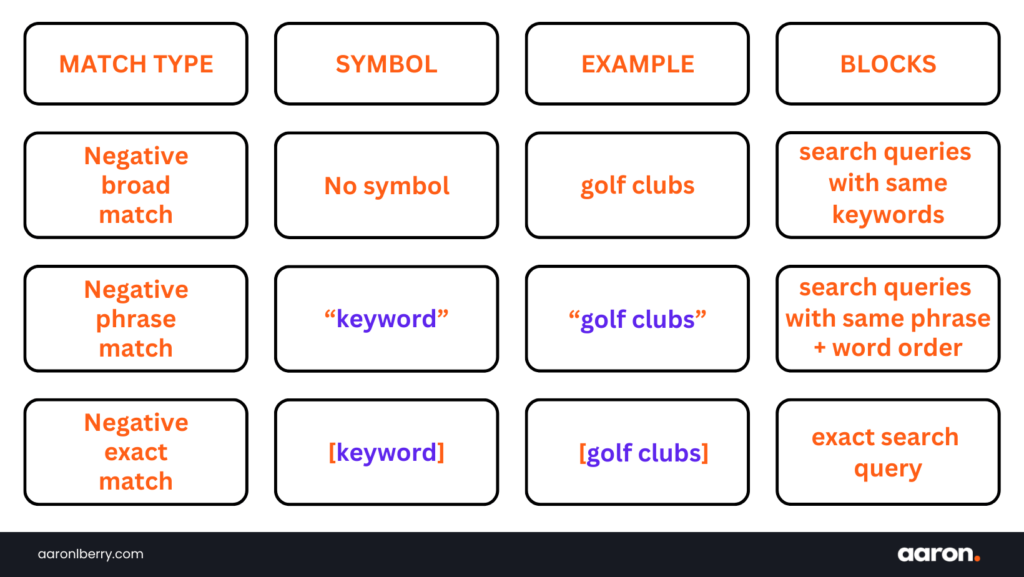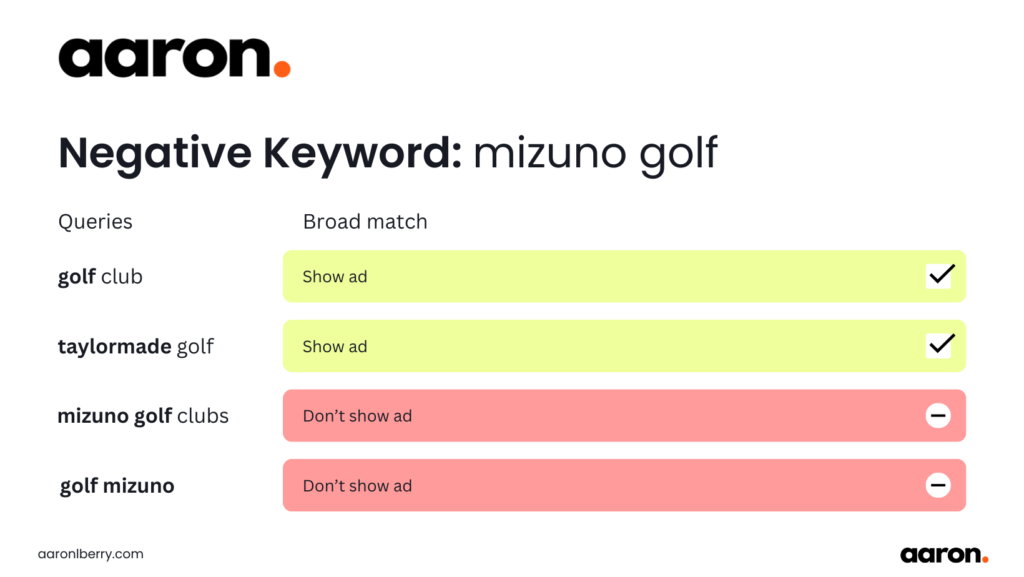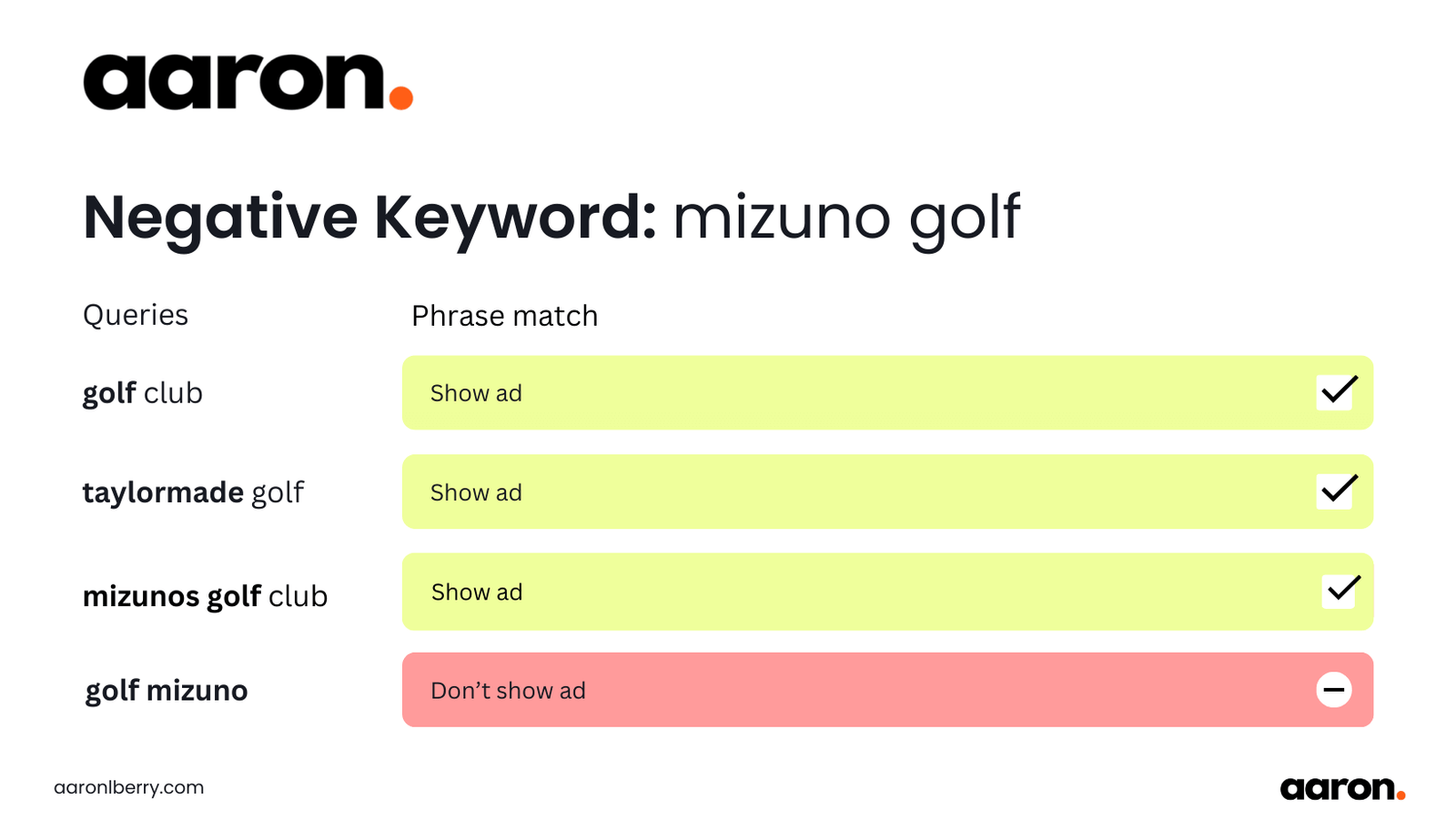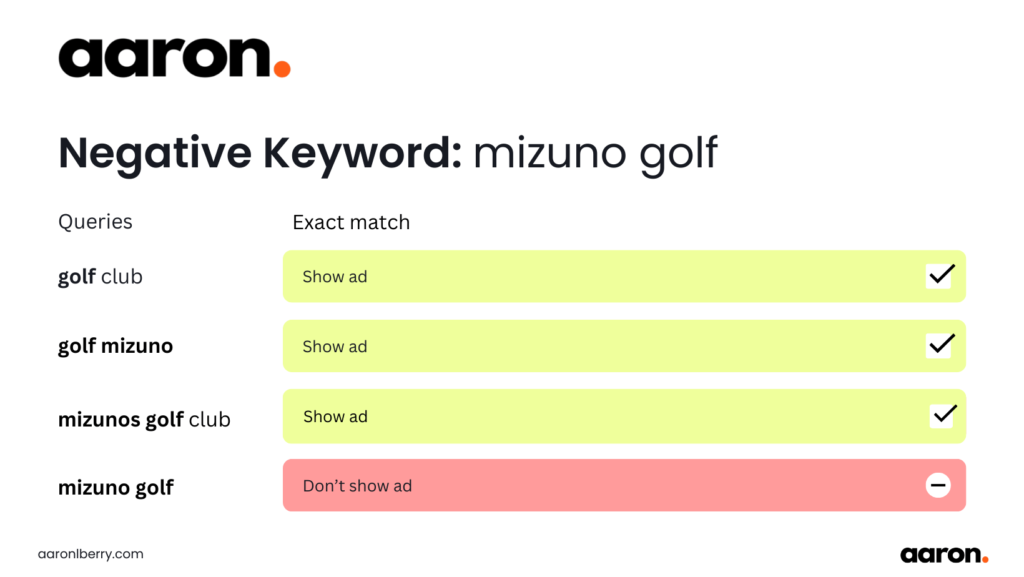In the fast-paced world of digital advertising, the success of Pay-Per-Click (PPC) campaigns often hinges on the precision of your strategy. Among the various techniques available to refine your ad targeting, one stands out for its ability to enhance both efficiency and effectiveness, negative keywords. This introductory guide is designed to help digital marketers of all levels find the usefulness behind negative keywords, providing a solid foundation for advertisers looking to optimize their campaigns.
Negative keywords are essentially the gatekeepers of your PPC campaigns, ensuring that your ads only appear in response to searches that are truly relevant to the products or services you offer. By filtering out unwanted search queries, they help conserve your ad spend while increasing the likelihood of attracting genuine, interested customers. But how do they work? Why are they so crucial for PPC success? And how have they evolved over time?
This graphic might help you understand a little better…

This post will take you through a comprehensive journey, starting from the basics of understanding negative keywords, to exploring their types and applications. We’ll discover strategies for implementing them effectively at various levels of your PPC campaigns and highlight advanced tactics for optimizing your negative keyword lists. Whether you’re a beginner or looking to brush up on your knowledge, this guide promises to equip you with the insights needed to leverage negative keywords for better campaign performance.
But before we get started, I summarized all types of negative keywords that can be used in your PPC campaign. This table should help you understand a little better what we’ll be going over in this post.
| Types | Pros | Cons |
|---|---|---|
| Broad Match Negative Keywords | Casts the widest net to filter out the most irrelevant traffic. Reduces the chances of ads appearing in unrelated searches. | Can accidentally exclude relevant searches if not used carefully. May limit visibility if overly broad terms are used. |
| Phrase Match Negative Keywords | Offers more control than broad match, targeting specific phrases. Prevents ads from showing for searches that contain the negative phrase in the specified order. | Might still miss variations that don’t match the order of words. Requires precise knowledge of unwanted search phrases. |
| Exact Match Negative Keywords | Provides the highest level of control and precision. Ideal for excluding highly specific searches that are known to be irrelevant. | Very restrictive; might miss out on broader, yet still relevant, search queries. Requires continuous updating to remain effective. |
Understanding Negative Keywords
Negative keywords might sound counterintuitive in the context of advertising, where the goal is to reach as wide an audience as possible. Yet, in the world of PPC (Pay-Per-Click) campaigns, they play a critical role. Simply put, negative keywords are terms or phrases you specify to prevent your ads from being triggered by certain search queries. This means if you add “free” as a negative keyword, your ads won’t show up for searches that include the word “free.” This precision tool ensures your advertising budget is spent on clicks that have a higher chance of converting to sales.
Importance in PPC Campaigns
The significance of negative keywords in PPC campaigns cannot be overstated. They help improve the relevance of your ads to your target audience, reducing the likelihood of your ads being displayed to uninterested users. This leads to a more efficient use of your ad budget, as it decreases wasted spend on irrelevant clicks. Moreover, by enhancing the relevancy of your ads, negative keywords contribute to a better Quality Score on platforms like Google Ads, potentially lowering your cost per click (CPC) and improving ad placement.
The Impact of Negative Keywords on PPC Success
Implementing negative keywords effectively can drastically improve cost efficiency in your campaigns. By eliminating unqualified traffic, you’re not only saving money but also ensuring that your budget is allocated towards searches that are more likely to convert. Additionally, improved ad relevance and Quality Score are direct benefits of a well-curated negative keyword list. Ads that closely match the search intent of the user are more likely to be clicked on, leading to higher conversion rates and a better return on investment (ROI).
In the ever-evolving landscape of digital advertising, the strategic use of negative keywords has become an indispensable tactic. From their humble beginnings to their current critical role in search advertising, negative keywords have demonstrated their ability to keep PPC campaigns lean, focused, and more successful than ever before.
Note
We’ll be focusing on how to use negative keywords in your Google search ad campaigns for the rest of this post.
Types of Negative Keywords and Their Application
In the world of PPC, negative keywords can end up saving you a lot of money with your paid-click campaigns. Knowing how to filter out the right keywords is essential to optimizing your campaigns. Let’s go over what each type of negative keyword does starting with the easiest to understand, broad match.
Broad Match Negative Keywords
Broad match negative keywords are the most encompassing type, designed to exclude your ads from showing on searches that include any word in your negative keyword phrase, in any order. For instance, if you use “free trial” as a broad match negative keyword, your ad won’t appear for searches like “trial free software” or “free software trials.” This type is particularly useful when you want to cast a wide net to exclude searches that are broadly irrelevant to your product or service.
When to Use Broad Match Negative Keywords

Use broad match negative keywords when your goal is to prevent your ads from showing for searches that are vaguely related to your offerings. It’s ideal for filtering out traffic that’s unlikely to convert, helping you save on ad spend while maintaining a focus on quality leads.
Phrase Match Negative Keywords

Phrase match negative keywords offer a middle ground, excluding your ads from searches that include the exact phrase or close variations of that phrase, in the same order. If “mizuno golf” is your phrase match negative keyword, your ad won’t show for searches like “golf mizuno” or “mizuno golf clubs,” but it might still appear for “mizunos golf club.”
Strategic Application of Phrase Match Negative Keywords
This match type is best used when you need to exclude specific phrases that are known to bring in irrelevant traffic. It’s more targeted than broad match, allowing for precise control over the exclusion process without being too restrictive, making it ideal for honing in on your ideal audience.
Exact Match Negative Keywords

Exact match negative keywords are the most specific type, blocking your ads from showing only when the exact keyword phrase is searched for. Using “mizuno golf” as an exact match negative keyword means your ad won’t show for that exact search but could still appear for searches like “mizuno golf clubs” or “golf mizuno.”
Best Practices for Using Exact Match Negative Keywords
Exact match negative keywords should be used for filtering out highly specific searches that you’ve identified as being irrelevant or unprofitable. This precision tool helps in targeting your ad spend towards the most relevant queries, ensuring maximum efficiency and effectiveness of your PPC campaigns.
Implementing Negative Keywords in PPC Campaigns
When it comes to actually implementing negative keywords into your campaigns, there are some things you should think about first…
Structuring Negative Keywords: Account, Campaign, and Ad Group Levels
Implementing negative keywords effectively requires understanding where to place them—be it at the account, campaign, or ad group level. Placing a negative keyword at the account level means it will exclude searches across all campaigns, ideal for universally irrelevant terms. At the campaign level, it helps refine targeting for specific initiatives, and at the ad group level, it allows for even more granular control over ad display, tailoring exclusions to match the theme and intent of each ad group.
Differences and Strategic Use
The strategic placement of negative keywords depends on the broadness of the term and its relevance to your campaigns. Account-level exclusions are best for broad terms unrelated to any of your products, while campaign and ad group levels allow for nuanced targeting, improving ad relevance and performance without sacrificing reach.
Finding and Selecting the Right Negative Keywords
Finding the right negative keywords is a crucial step in optimizing your PPC campaigns. Tools and techniques like keyword research tools, analyzing competitor keywords, and utilizing Google’s Keyword Planner and Autocomplete features can provide insights into which terms to exclude. Additionally, regularly reviewing and updating your negative keyword list based on search terms reports helps keep your campaigns efficient and effective.
Keyword research tools offer a wealth of data on search volume and trends, helping you identify irrelevant terms that could waste your budget. Competitor analysis lets you see which terms they exclude, giving you an edge in ad placement. Google’s Keyword Planner and Autocomplete are invaluable for discovering variations of search queries that might not convert, while search terms reports reveal actual searches triggering your ads, highlighting potential negatives.
Regular review and updates to your negative keyword list ensure your campaigns remain relevant and competitive. This ongoing process allows for the refinement of your targeting strategy, continually improving campaign quality and reducing wasted ad spend.
Advanced Strategies and Best Practices
Now let’s get into some of the nitty and grittier parts of negative keywords and how you can use these to supercharge your ad campaigns! Stay with me here, I’m about to share with you some of the best-kept secrets when it comes to optimizing ad campaigns.
Optimizing Negative Keyword Lists for Enhanced Performance
Optimization of your negative keyword list is an ongoing process that demands regular attention. Incorporating continuous optimization and refinement strategies, such as analyzing search term reports for new irrelevant search terms and monitoring performance metrics with keyword tools, is key to maintaining the efficiency of your PPC campaigns. The role of AI and machine learning in negative keyword optimization is becoming increasingly significant, offering sophisticated tools to predict and automate the addition of new negative keywords based on performance data and search patterns.
Common Pitfalls and How to Avoid Them
A common challenge in managing negative keywords is overfiltering, where too many restrictions can lead to missed opportunities and decreased ad visibility. To avoid this, balance is crucial; ensure you’re excluding terms that are truly irrelevant without limiting your campaign’s potential reach. Balancing broad and specific negative keywords is essential to maintain this equilibrium, allowing you to target the right audience without excluding potential customers.
Measuring the Impact of Negative Keywords on Campaign Performance
To truly understand the effectiveness of your negative keyword strategy, monitoring key performance indicators (KPIs) such as click-through rate (CTR), conversion rate, and overall campaign quality improvement is essential. These metrics provide insight into how well your negative keywords are contributing to campaign success. Additionally, engaging in case studies and success stories can offer valuable lessons and best practices from other advertisers who have successfully optimized their campaigns with negative keywords.
What Is A Negative Keyword – FAQ
Got questions, I’ve got answers.
Maximizing PPC Efficiency with Negative Keywords
Negative keywords are a powerful tool in PPC campaign management, crucial for minimizing wasted ad spend and improving the relevance of ads to potential customers. By carefully selecting and regularly updating negative keywords, advertisers can significantly enhance campaign efficiency and effectiveness. The strategic use of negative keywords, combined with ongoing optimization and refinement, ensures that your advertising efforts are both cost-effective and highly targeted.
Future Directions in Negative Keyword Use
The future of negative keyword optimization looks promising, with advancements in AI and machine learning expected to play a larger role in automating and refining the process. Predictions for emerging trends include more sophisticated predictive analytics for negative keyword discovery and dynamic adjustment of keyword lists based on real-time campaign performance data. As the digital advertising landscape continues to evolve, the strategic application of negative keywords will remain a cornerstone of successful PPC campaigns.







